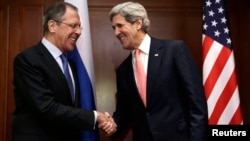BERLIN —
U.S. Secretary of State John Kerry visited Berlin Tuesday, on the second leg of an 11-day trip that includes stops in Turkey and the Middle East. A major focus of Kerry's visit to Germany was a meeting with his Russian counterpart.
Before leaving for talks in Paris, U.S. Secretary of State Kerry met for almost two hours with Russian Foreign Minister Sergei Lavrov. State Department spokeswoman Victoria Nuland told reporters that the two men spent most of their meeting discussing Syria.
Later this week in Rome, Kerry will attend a conference on Syria that aims, for the first time, to bring together government representatives and opposition leaders. Kerry and Lavrov also discussed the issue of adopted Russian children.
Political analyst Sergei Lagodinsky said Russia is overplaying the adoption issue to score domestic political points. Yet he says it was smart for Kerry to address it head on.
"It was a nice gesture to signal to the Russians 'we understand that you are very critical or anti-American, but we take your concerns seriously enough to address them in such a bilateral meeting,'" he said. "And I think it's not a reset button, but it's a sign of saying 'OK, we understand that there is animosity involved in your internal debates, but we nevertheless take the issue of children seriously.'"
Earlier in the day, Kerry met with German Chancellor Angela Merkel. In a joint press conference, Kerry reiterated the Obama administration's interest in signing a free trade agreement with the European Union.
"Most important, I think the President - President Obama - believes there is a unique opportunity, looking at now, and that is the Transatlantic Partnership, Investment, and Trade Agreement," he said. "We think this is something that can lift the economy of Europe, strengthen our economy, create jobs for Americans, for Germans, for all Europeans, and create one of the largest allied markets in the world."
Kerry also addressed the Iran nuclear issue. But the secretary said he was reluctant to comment extensively because talks were still ongoing with Iran in Almaty, Kazakhstan - involving the United States, Britain, France, Germany, Russia and China.
"There is a diplomatic path. There is a clear way through this," he said. "And I want these talks to have their chance to work through before I comment further."
During a question and answer session with students at Berlin's Free University, Kerry alluded to U.S. President Barack Obama's visit next month to Israel and the Palestinian Territories. But he tempered expectations ahead of that trip, saying he and the president intend to consult and listen to both sides.
Before leaving for talks in Paris, U.S. Secretary of State Kerry met for almost two hours with Russian Foreign Minister Sergei Lavrov. State Department spokeswoman Victoria Nuland told reporters that the two men spent most of their meeting discussing Syria.
Later this week in Rome, Kerry will attend a conference on Syria that aims, for the first time, to bring together government representatives and opposition leaders. Kerry and Lavrov also discussed the issue of adopted Russian children.
Political analyst Sergei Lagodinsky said Russia is overplaying the adoption issue to score domestic political points. Yet he says it was smart for Kerry to address it head on.
"It was a nice gesture to signal to the Russians 'we understand that you are very critical or anti-American, but we take your concerns seriously enough to address them in such a bilateral meeting,'" he said. "And I think it's not a reset button, but it's a sign of saying 'OK, we understand that there is animosity involved in your internal debates, but we nevertheless take the issue of children seriously.'"
Earlier in the day, Kerry met with German Chancellor Angela Merkel. In a joint press conference, Kerry reiterated the Obama administration's interest in signing a free trade agreement with the European Union.
"Most important, I think the President - President Obama - believes there is a unique opportunity, looking at now, and that is the Transatlantic Partnership, Investment, and Trade Agreement," he said. "We think this is something that can lift the economy of Europe, strengthen our economy, create jobs for Americans, for Germans, for all Europeans, and create one of the largest allied markets in the world."
Kerry also addressed the Iran nuclear issue. But the secretary said he was reluctant to comment extensively because talks were still ongoing with Iran in Almaty, Kazakhstan - involving the United States, Britain, France, Germany, Russia and China.
"There is a diplomatic path. There is a clear way through this," he said. "And I want these talks to have their chance to work through before I comment further."
During a question and answer session with students at Berlin's Free University, Kerry alluded to U.S. President Barack Obama's visit next month to Israel and the Palestinian Territories. But he tempered expectations ahead of that trip, saying he and the president intend to consult and listen to both sides.




